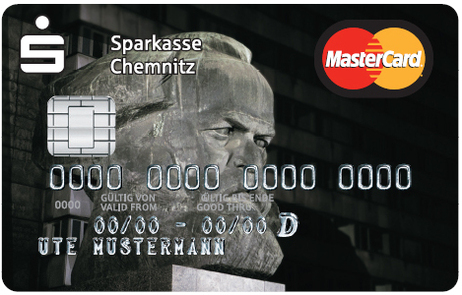
The German bank Sparkasse Chemnitz recently launched a Karl Marx credit card. The bank let people vote online for 10 different images, and Marx was the "very clear winner," beating out a palace, a castle and a racetrack, among others. Reuters has more on the story.NPR's Planet Money Blog has already grabbed the torch from Sparkasse Chemnitz's hilarious customers and started soliciting taglines for this mashup of anti-capitalist and capitalist symbolism. Here are my favorites:
Michael Benveniste (MichaelBenveniste) wrote:
Capital is Dead Labor. Irony is Priceless.
Tim Myers (Mr. Zurkon) wrote:
Control the means of consumption.
Gin Phillips (Ginbug) wrote:
Capitalism: It misses the Marx.
J Sno (Anarchaosmos) wrote:
Philosophers have only interpreted the world, the point, however, is to charge it!
Adam Saunderson (666Larry666) wrote:
Because we all deserve some credit.
David Kemp raised a good question:
Do payments with this card become personal debt, or the people's?
My personal submission is:
Classy.
What does it mean that Sparkasse Chemnitz's customers resoundingly choose such an ironic image for the new credit card? Is it simple kicks and giggles, or a more profound statement about Marxism and the role of credit in contemporary capitalism? Is it satire? I feel like the intentionality required for satire precludes it from arising in a crowdsourced vote. As opposed to a team where the members know each other and are organized to work toward the same end, the members of a group cannot all have the same points to make about a subject. However, a group can think it's pretty funny to put Marx on a credit card. The standard for funny is easier to satisfy than for satire. Like irony, satire has a number of elements interacting together, only one of which is humor (the others being critique, concealment, and imitation). Whenever there is satire there must be humor, but where there is humor, satire is only a possibility.
No comments:
Post a Comment